
Why Wear A Medical Bracelet If You Have Multiple Sclerosis?
Living with Multiple Sclerosis can present challenges such as limited dexterity and mobility, loss of sight and speech. During an emergency you might not be able to communicate what’s happening, what medications you’re taking or any other vital medical information that is needed for first responders to treat you accurately.
In this blog we will explain the importance of wearing a medical bracelet for MS and how it could help save your life or get you better treatment in an emergency.
What is Multiple Sclerosis?
Multiple Sclerosis (MS) is a chronic condition that affects our brain, spine and vision, as well as causing problems with our balance and muscle control. This happens if our immune system attacks the outer layer of our nerves. Our damaged nerves prevent our brains from sending signals throughout the body, impacting our movement and causing pain and fatigue. Symptoms can vary and can worsen over time. Mild symptoms may not need treatment, but some people may have trouble getting around and achieving daily tasks.
The main symptoms include:
-
- Fatigue
- Vision problems, dizziness and vertigo
- Sensory overload, numbness or tingling in different parts of the body
- Muscle stiffness and spasms, or difficulty walking
- Problems with balance and co-ordination
- Problems with thinking, learning and planning.
Since symptoms can vary from person to person and considering that a relapse or worse-than-expected symptoms can sadly occur without warning … we provide medical jewellery that raises MS awareness.
How a medical bracelet can support you in an emergency
Medical bracelets can explain symptoms, which can notify strangers that you need help. They can speed up effective first aid if your condition is not what a medical professional would first assume it is. These bracelets could be especially helpful if you yourself are unable to communicate the help you need.
First aiders and medical professionals will check your Airways, Breathing and Circulation (ABC) as a priority. This means they will take your pulse, so a bracelet, wristband or necklace will be found when they go to your pulse points at your wrist or at your neck. First responders are trained to look for medical tags.
Do I need a medical bracelet if I have Multiple Sclerosis?
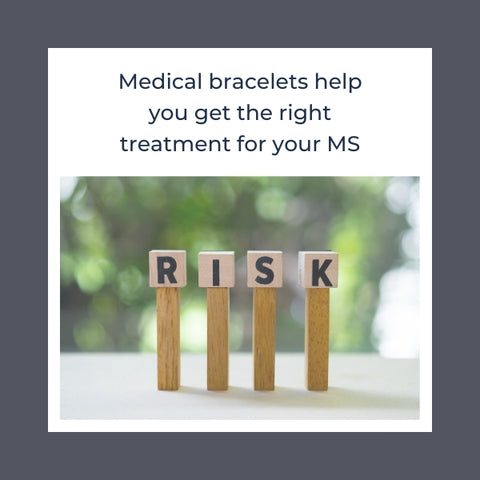
MS is an unpredictable illness.
MS can affect the flow of information within the brain and from the brain to the body. A person diagnosed with any form of Multiple Sclerosis is at risk of disabling symptoms or other complications. Cognitive impairment, sensory impairment, and venous thromboembolism (VTE) are some of the major complications.
Wearing a medical bracelet can alert others of your Multiple Sclerosis which would get you a quick evaluation from emergency workers, allowing you the right treatment in an emergency, even when a patient can’t speak for themselves or becomes unconscious.
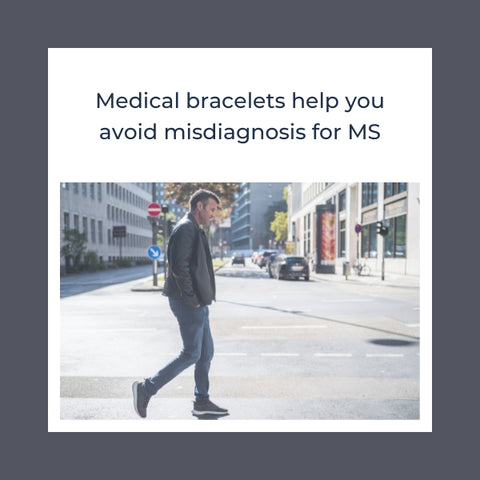
Avoid misdiagnosis.
Problems with balance and feeling dizzy are common with MS and can have knock-on effects on your walking. Like all MS symptoms, these issues affect people differently, and vary from day to day. You might be wobbly on your feet from time to time, or you might need to move with more care than before to avoid losing balance.
These balance problems may cause patients to be mistaken for alcoholics, which could cause them to be mistreated or misdiagnosed. Wearing a medical bracelet with “Multiple Sclerosis” inscribed can help others identify your condition better and get you the right treatment whenever possible.
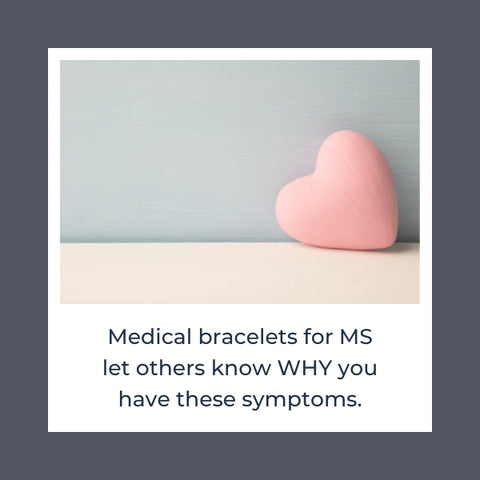
Helps to understand why you have certain symptoms.
Patients with MS have a significantly increased risk of developing cardiovascular problems such as heart attack, stroke or heart failure. However, regular physical activity may help alleviate MS symptoms and reduce cardiovascular risk.
Wearing a medical bracelet can help first responders know the exact cause of your heart problems, rather than trying to figure out the root cause. This can help speed up effective treatment and let others know of your condition.
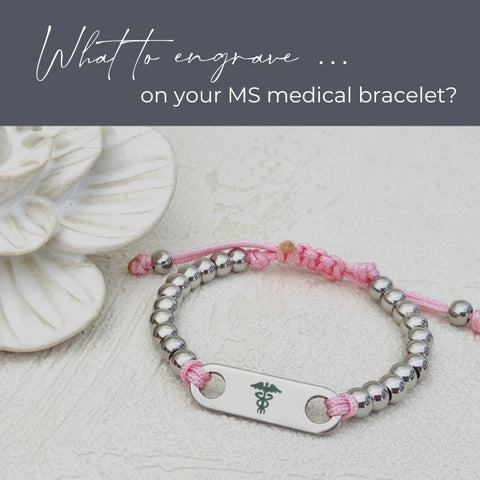
What should I engrave on my medical bracelet?
Your bracelet might state a diagnosis, so your symptoms are instantly recognised, or it could give a directive such as “Call (Name) on +44 123 456789” so your family can be notified of what has happened and advise doctors on your behalf. This is a personal choice, and you can reveal as many details as you wish.
As a guideline, your bracelet should say "MS" or "multiple sclerosis”, so it explains why your movement, or senses are strained. If you wish to add humour, you could write “I’m not drunk, I have MS”. Your bracelet could explain why you've fallen or that your carer should be notified or explain that you are a carer yourself, for someone with MS, so that person needs to be checked on. We are happy to organise similar bracelets for you and your family as appropriate so both angles are covered, and you can have matching jewellery in styles you both like.
If the text is clearly understandable, it can be discreet or stylised. Our jewellery is designed to be personalised so you get an item you will wear. MS shows up in different ways, so we have a variety of styles for our medical jewellery.
Where to go for more support?
Although many people living with advanced MS will be out and about with a carer, there are many in the early stages who do not show any visible signs. Rachel was parked in a car park space reserved for people with mobility issues, as it allowed more space to open the doors to get in and out. When she got back to her car, a passer-by commented to her that she did not look disabled.
This is unfortunately a common reality for a person trying to get out and use their better days during the earlier stages of MS. Of course, it is not your job to correct every stranger you meet, but a medical bracelet may be suitable ‘evidence’ to raise awareness and prevent that stranger from jumping to conclusions the next time they encounter an invisible condition.
Shift.ms covers “Things not to say to us”. This includes “You don’t look sick to me”, “Were you born that way?” and “I hope you get better”. All of which would fit onto a personalised bracelet if you were fed up with situations like Rachel’s! In fact, there is an Instagram account called @Stares_and_steps following Tara’s journey through life with MS using honesty, positivity and humour, which concludes that “people are resilient because of our ability to find humour and irony in situations that would otherwise overpower us”. Her daughter’s reaction to first seeing Tara in a wheelchair is that they can now eat in restaurants that don’t have enough chairs! You could add a personal, uplifting or humorous quote on one side of a tag and emergency information on the other.
Unsympathetic strangers and food-motivated children aside, medical jewellery is the most effective when it reflects accurate, comprehensive, and easy-to-read medical information. And to get the attention it needs in an emergency; we would always recommend including a medical symbol. Ask your doctor what text is most medically important to include. They can confirm well-known abbreviations for your conditions and medications. This will allow you to fit additional information on your ID. Multiple Sclerosis can be reduced to MS, and this can instead be engraved on your medical bracelet to fit more information if you wanted a longer message.
Overcoming MS connects to others with an interest in healthy living. This is a supportive community, which helps people to feel healthy in every aspect they can, by taking control of everything they can. One active follower, Heather, is a blogger in her own right if you want to see how it can benefit somebody, explore this link. Heather is a 27-year-old actor, teacher and MS Society Support Volunteer. There are also podcast episodes available and a link to Yoga for good and bad MS days.
Jenny is a single mum to a teen and a tween. Blog topics include more advanced MS symptoms and honest, relatable posts about ‘Nothing days’ alongside tips she has found effective in rebuilding her life. This blog is a fantastic balance of positivity and reality. Nobody is forcing toxic positivity upon you but when we acknowledge rough times, we also need to be able to break out of the slump, once we have given ourselves a moment to stop putting on a brave face. Jenny posts links to a joint podcast with Heather (mentioned above).
The narrative style of this blog post will make you smile and relate and want to take this man out for a drink at your local pub. It’s a simple word press blog and he posts when he has the time to do so.
And if you like the idea of doing a challenge walk or other event, you can start your own fundraising challenge.
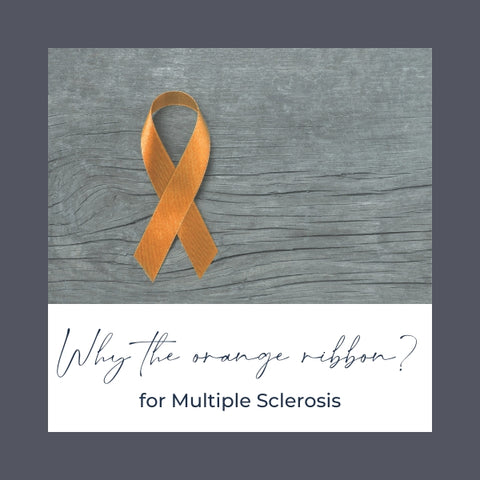
Colours and symbols.
We are open to requests, including colours and symbols associated with any condition. For example, MS is at least partially associated with bright orange. Orange is used in the MS Society for the UK and USA but in Canada it is not. The MS Trust in the UK uses light blue. Most people who are familiar with the condition do associate an orange ribbon with MS but it’s less well-known outside of the MS community. If you want to include the colour orange in your bracelet, go for orange cord in our Soul bracelet, Pip bracelet, or any of the cord styles. Or you could have a custom orange and white silicone wristband.
If you want to sport an orange ribbon pin to raise awareness for MS, get yours here.
As things currently stand, it may help to indicate MS amongst people familiar with the MS Society here and in the USA, but orange ribbons are also used for ADHD, Melanoma, Self-injury awareness and Malnutrition, amongst other things. As discussed here.
Saying this, fundraisers for the MS Society can do so in bright orange. If you are similarly inclined to spend your mornings running around sweating, instead of enjoying a hot coffee and a filling brunch, then a MS medical band will put your mind at ease in the off chance that you need assistance during your training runs or charity endeavours.
MS isn’t about giving up on your ambitions. Just rethinking how to achieve them.
As previously said, MS takes all sorts of tolls and as shown, it inspires all sorts of resilience. Whether you are inspired to start your own blog, physical challenge or MS community, we hope that a medical bracelet can alleviate some aspect of worry as you continue life’s adventures.
Stay connected for all the latest news and tips about medical jewellery. Sign up for our newsletter now to be one of the first to discover the best-looking medical alert jewellery, useful tips, and special offers. Plus, you’ll get a free printable wallet card for your emergency contact information.


Leave a comment